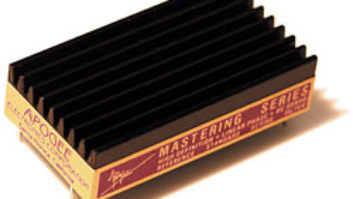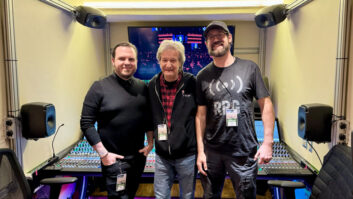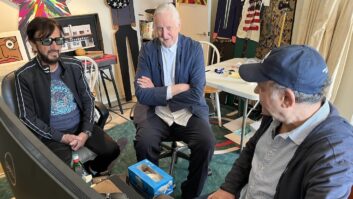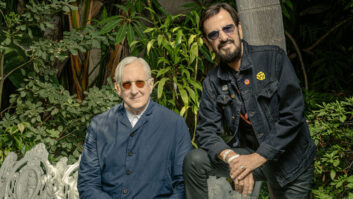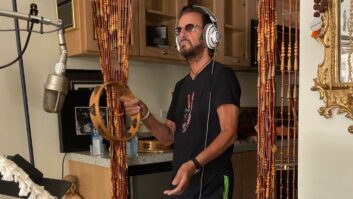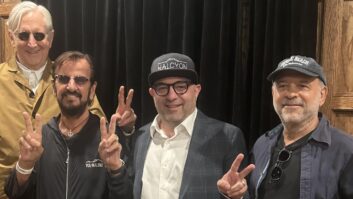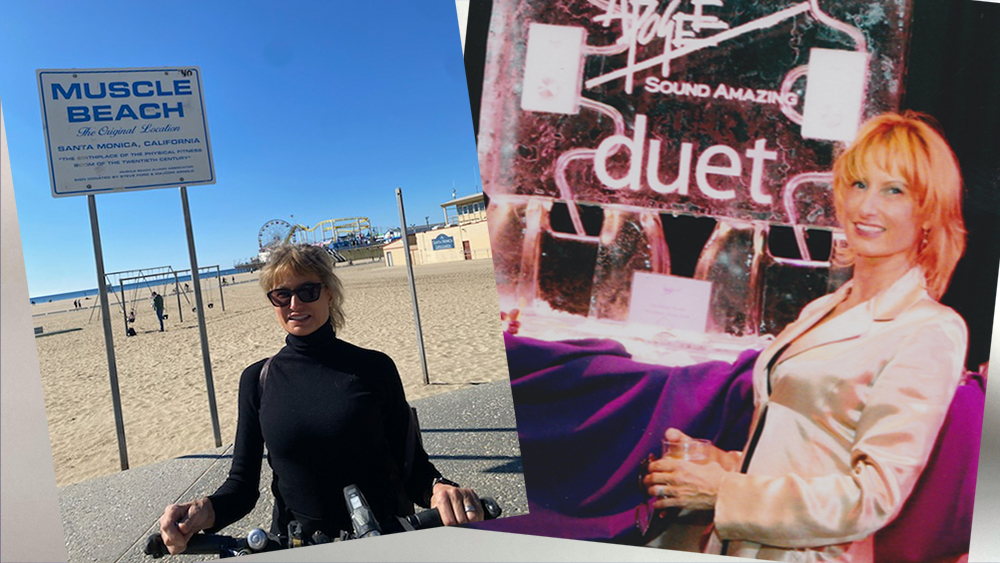
New York, NY (March 29, 2024)—On a late Friday afternoon in early January, I stopped by Apogee Electronics’ headquarters in Santa Monica for a walkthrough of the space, in advance of an event Mix would be hosting there in March. The left side of the warehouse space, with its industrial-loft-style, open floor plan of cubicles and offices, was mostly cleared out for the weekend, but the right half of the building, with a live performance stage and world-class recording studio, was still buzzing.
A small team of Apogee employees was busy tuning a temporary Dolby Atmos live monitor setup, with Genelecs on mic stands and hanging from the exposed beams, for a live performance that Sunday. Music was playing, followed by pink noise, followed by comments from the control room and front of house. Betty Bennett, the company co-founder and today its owner/CEO, walked the room in blue jeans and sneakers, stopping to listen a couple of times, then checking in with the mixers and others on the floor. “Tom!” she said as I walked up. “What do you want to hear?”
After sitting down for an immersive playback of Exodus and Avalon, Bennett led me on a quick tour of the rest of the facility, passing by the lounge and saying, “We thought we’d set up an Atmos Home system in here,” on through the shipping department (“We’ll cover this with drapes and then we can put the food and a bar in here”), across the patio (“We’ll set up a few round tables and chairs, so people can sit down”), on back to a house across the alley, where a full 7.1.4 mix/monitor system was set up in a hybrid pro-meets-living room open orientation, with Pro Tools and Logic and an Avid controller. “If you like, we can ask Alan Meyerson to play back tracks in here,” Bennett said. “He just recorded and mixed the new Dune score with Hans Zimmer.” I nodded. “Uh, sure. That would be great. Thank you.”
Back in the lounge, we sat down with Marlene to go over the details of the event, and soon fell into talking about the upcoming NAMM Show, plans being put in motion for Apogee’s 40-year anniversary throughout 2025, whether they would go with studio monitors or small line-array speakers in the 200-cap room when they put in an installed Atmos Live system later in the Spring. We talked a bit about our families and all the madness in the world. Just catching up.
Then she turned to me, and said, “Do you like tequila? We were just in Mexico and I brought back a couple bottles of this really good tequila.” After a couple of sips and a few more laughs, she called for a couple of Ubers—one to take me to my hotel, the other taking her to dinner with her daughter.
Leadership and Compassion
I’ve known Betty Bennett for more than 20 years, but I’d never really seen her in her element, at home at Apogee. On the drive to the hotel, I thought to myself, “Wow. She’s a CEO, and she’s on the floor on a Friday. She knows what’s going on, down to the details. She’s the leader, but she talks to her employees like she’s part of the team. Hell, I wouldn’t mind working for her.”
You won’t find much in a Google search for “Betty Bennett Apogee,” though her story from a business perspective is worthy of a Forbes cover, and from a pro audio perspective, worthy of Mix. (Spoiler alert: It’s coming soon.) Some of that is detailed below, from her rapid rise at Soundcraft, to co-founding Apogee, to becoming the first Apple iOS audio partner, to one of the few CEO/Owners of a private, woman-owned business in pro audio.
Much of her success can certainly be attributed to her seemingly innate sense for managing and growing a business, coupled with drive and determination. She has a nose for what the market needs, and she runs the company on core principles like quality and commitment. She can exhibit all the qualities of the modern CEO, and I have no doubt that she could be tenacious, though always fair, in negotiations.
It’s another side of Bennett’s character, however, that makes the difference, that makes a good company become a great company, one that is going strong at 40. Along the way, she created a corporate culture, one based on compassion and caring, both for employees and the world around them.
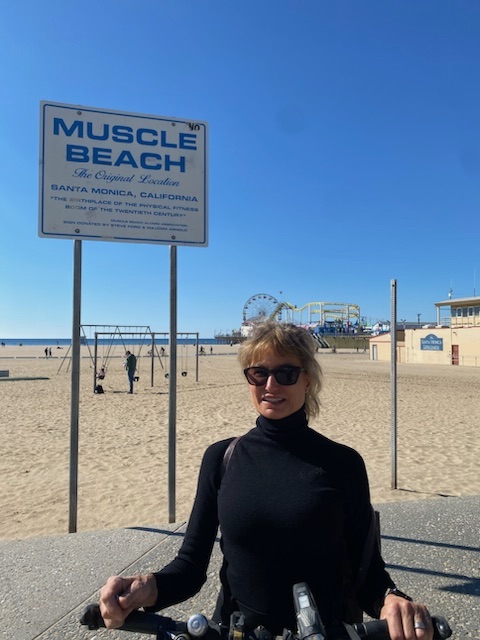
Apogee has run on solar power since 2000, same with her home. She rides her bike to work nearly every day, though she admits to catching a ride home if it’s dark. The company’s headquarters has been Green Certified by the City of Santa Monica for years. She does not like plastic, and she is active in environmental issues. She believes in contributing to the local community.
Bennett is also an active supporter of young women just beginning a career in business, or in audio, and she is a strong believer in mentorship programs. The worlds of business and professional audio are both heavily dominated by men at the high end. Bennett knows about challenges, and she knows a thing or two about success.
So as we neared the end of March, and the last few days of Women’s History Month, we asked the normally publicity-shy Bennett if she would answer a few questions about the women who have inspired her over the years, and how she would like to inspire others.
Here’s what she had to say:
On who inspires her personally…
My mother immediately comes to mind. She possessed an unbelievable strength and tenacity, despite the hardships she and her family faced during her upbringing. She grew up during the Great Depression, and she lost her father when she was just 10 years old. As one of five children, she had to quit school to take care of her three younger siblings while her mother and eldest sister went to work to support the family.
Even with these challenges, my mother never gave up on her education. She returned to school and completed her studies after raising my sister and me. Her resilience was further tested when my sister passed away at the age of 23, a heartbreaking experience for my father and I, but especially for my mother. Somehow, she found the courage and strength to carry on and even find happiness again.
Her unwavering belief in my abilities and her support for my endeavors knew no bounds. When I started Apogee, she took it upon herself to visit music stores and advocate on my behalf, even though she didn’t fully grasp the intricacies of my business. Armed with my business cards, she confidently told store owners that if they were involved in recording, they should be using our products. She encouraged them to call me with any questions, displaying no fear or embarrassment, only love and confidence in me.
I feel incredibly fortunate to have had a mother like her in my life, and I wish everyone could have someone like her on their team. Her strength, resilience, compassion and support continue to inspire me to this day.
On who inspires her professionally…
Two women who have inspired me professionally are Hillary Clinton and Shirley Chisholm, both trailblazers who have left an indelible mark on American politics and women.
Hillary has exhibited remarkable strength, courage, tenacity and resilience throughout her career. I am particularly drawn to a quote that she has hanging on her wall at home: “Women need to think like a man, behave like a lady, look like a young woman and work like a horse.” This quote encapsulates the challenges and expectations that women face in their professional lives, and her ability to navigate these challenges with grace and determination is truly inspiring.
Shirley Chisholm, the first Black congresswoman and the first woman to run for president with the backing of a major party, has been another major inspiration to me professionally. Her quote—”You don’t make progress by standing on the sidelines, whimpering and complaining. You make progress by implementing ideas. If they don’t give you a seat at the table, bring a folding chair. We must reject not only the stereotypes that others have of us but also those that we have of ourselves,”—perfectly captures her bold, proactive approach to leadership and her refusal to be sidelined or stereotyped.
On her own story…
My journey in the audio industry began in 1978 when I started working for Soundcraft in Kalamazoo, Michigan. As the general office person, my responsibilities ranged from answering phones to maintaining the company’s financial records. My deep fascination with the company and its equipment led me to read all the manuals and listen attentively to support calls, absorbing the questions and answers discussed.
Four years later, I was promoted to President and tasked with relocating the company to California. Once in California, with a new and inspired team, the company experienced rapid growth, and in 1985, I successfully negotiated the sale of the American Division to Harman.

Shortly after the sale, I co-founded Apogee with Bruce Jackson, a live sound engineer, and Christof Heidelberger, an engineer I knew from Soundcraft. Bruce provided the critical listening skills as well as audio experience, Christof brought his engineering expertise, and I oversaw the business aspects.
Our initial product, anti-aliasing/anti-imaging filters, aimed to address the recording industry’s concerns about the sound quality of the recently launched CD format. Despite the consumer embrace of the CD format, critical listeners such as artists, producers, engineers and mastering engineers preferred the sound of cassettes and vinyl. We identified the brickwall filters in digital multitrack recorders made by Sony, Mitsubishi and Otari as the main culprit. By developing a pin-for-pin compatible filter and replacing the original filters in these $125k machines, we enabled owners to enhance their equipment’s sound quality, even at the cost of voiding their warranties. Word quickly spread, and artists began to insist on recording only on Apogee Enhanced machines.
Continuing our research and development efforts, we introduced the AD500, incorporating our low-jitter clock, DC-to-DC power supply, and UV22 algorithm for bit reduction from 20 or 24 bits to 16 bits. We followed up with the DA1000, AD8000 with Pro Tools compatibility, and other innovative products through the 1990s and into the 2000s.
In the late 2000s, we formed a partnership with Apple, co-developing JAM, the first audio iOS product. This collaboration marked the beginning of a successful and ongoing relationship between our companies.
Today, Apogee remains at the forefront of audio innovation, focusing on immersive audio technologies such as Dolby Atmos, Sony 360RA and Spatial Audio. Our Symphony MKII Special Edition and controller were developed specifically for this new market and are already seeing great success. Nearly 40 years after our founding, we continue pushing the boundaries of audio technology.
On the future of women in the professional audio industry…
I feel a sense of excitement and optimism. Over the years, I’ve witnessed a growing awareness and commitment to diversity and inclusion within our field.
One of the most encouraging developments I’ve observed is the rise of mentorship and support networks specifically designed to empower and guide aspiring female audio professionals. Organizations like We are Moving the Needle, Girls That Code, and Girls Make Beats are doing remarkable work in breaking down barriers and providing invaluable resources and guidance to women entering the industry.
In fact, just this past year, I had the opportunity to visit several audio schools, including NYU, Berklee and CRAS. What struck me during these visits was the impressive number of young women enrolled in audio programs. In some classes, the female students even outnumbered their male counterparts. This is a clear indication that more and more women are recognizing the exciting opportunities available to them in audio and are actively pursuing careers in the industry.
We’re not there yet; there is still work to be done. However, I firmly believe that as our industry continues to evolve, women will have even greater opportunities to thrive, innovate, and shape the future of audio production and technology.
At Apogee, we have been hosting visits from members of the 1500 Academy, and it’s been inspiring to engage with the next generation of audio professionals, particularly the talented and driven young women among them.
I am filled with hope when I think about the future for women in the pro audio industry. With the increasing support, resources and opportunities I am confident that we will see a new era, with many more women as part of the mix.
On her daughter…
I can’t help but beam with pride when I’m asked about Alex. When choosing her name, I considered the challenges she might face as a woman in her future career. I decided on the name Alex, hoping that in her professional correspondence, people would not be biased by her gender before meeting her in person.
As Alex grew up, she encountered many of the same challenges I faced during my own career. We would often discuss these experiences, and I believe that my journey has played a role in shaping her into the fearless woman she is today. Alex possesses an unwavering “can-do” attitude that never ceases to amaze me—there isn’t a challenge she fears.
Beyond her strength, Alex has a sensitive and compassionate side. She serves on the Board of Corazon de Vida, an orphanage just across the border in Mexico. When she first began working with them as a high school senior, the nun who ran the orphanage had to lock the refrigerator because she couldn’t afford for any child to take more than their share. When the lunch bell rang, every child quickly found their seat, ate everything on their plate, and never complained. Over the years, our family, along with Apogee and other companies, has helped install running water, bunks for the children, a playground, and even purchased a van for transportation.
She excelled academically, graduating from UC Berkeley with a degree in Political Science and going on to earn a Master’s in Film from USC. Her first documentary was even shortlisted for an Oscar. I’m just as pleased that she inherited our dedication to environmental issues. Today, she sits on the Board of UCLA’s Environmental Institute, working tirelessly to raise money each year to fund student research.
To say that I am extremely proud of Alex would be an understatement. She has grown into a remarkable woman who fearlessly tackles challenges, compassionately gives back to her community, and continuously strives for excellence in her personal and professional life.
